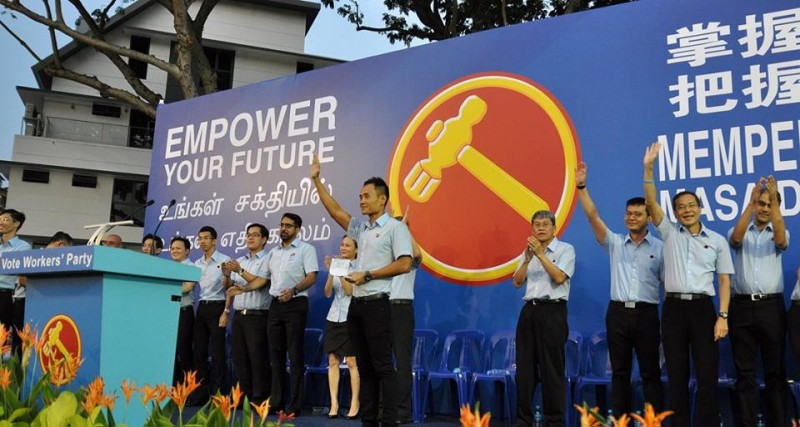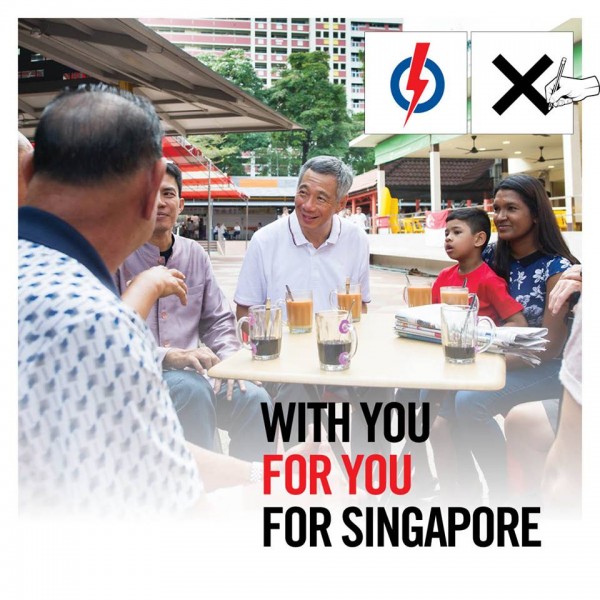
Opposition candidates from the Workers’ Party hold an election rally. Photo from the Facebook page of Workers’ Party
After the festive celebration of the country’s 50th founding anniversary last month, Singapore is now preparing for the general election on September 11. For the first time in Singapore history, all 89 seats are being contested, which means the ruling People’s Action Party (PAP) has to work harder to maintain its dominance in the polls. PAP has been in power in the past 50 years and has never lost an election, although it got fewer votes in the 2011 elections.
The prime minister’s slogan, “With you, for you, for Singapore”, reminds voters of the country’s achievements under the leadership of PAP. Meanwhile, opposition parties are highlighting the need for change and the importance of checks and balance in the government. The main theme of the opposition Workers’ Party is “Empower your future”, while the battle cry of Singaporeans First Party, another opposition group, is “Restore our nation”.
Indeed, PAP is right to argue that Singapore prospered under its leadership. But a growing number of people is complaining about PAP’s inability to address income inequality, rising cost of living, and the influx of foreign workers. The last point has bitterly divided the country since some Singaporeans are blaming the rise of foreign workers for the deteriorating quality of living in the city state.
Ten parties are participating in the general election 2015.

Singapore Prime Minister Lee Hsien Loong meets with constituents. Photo from the Facebook page of People's Action Party
As election campaigning becomes more intense this week, many Singaporeans are expressing their views about the campaign tactics and platforms of candidates and political parties.
Anil Balchandani, writing for the alternative news website The Online Citizen, questions the decision of the government to shorten the period of campaigning:
If the Prime Minister thinks this is a watershed election, then it puzzles me that the electorate is only given eight days to decide on this. How is it that the Prime Minister expects the electorate to comprehend all the issues canvassed by his party and the opposition for years to come in eight days?
Blogger Belinda Yek wrote that the country's next set of leaders should be selected based on their election promises and not simply on their party affiliation:
I wouldn't want to have a situation where time and resources are wasted and unsatisfactory compromises made just because of the increased opposition seats and their veto power in parliament. Instead, when voting for the opposition, vote based on the election promises and programs they will implement, and judge them with the same fervour that we judge the incumbent as they have had 4 years since GE2011 to deliver on their promises and programs.
Young writer Cassandra Chia attended an election rally and wrote her observations:
I sat down on the grass patch with the rest of the crowds. What I initially expected was a rock concert style environment with many die-hard roaring fans, just that the singers singing were now replaced with candidates speaking for their political party. However, the atmosphere was not as “electrifying” as I imagined.
Si Ying, another young writer, interviewed some senior voters who said they will vote for “stability”:
“Stability” and “assurance” are common factors to account for why most of the elderly citizens would rather stick with the familiar than to risk change.
But there’s also a clamor for change among young people who feel discontented with the country’s present situation:
…we’re also seeing a significant slice of the younger generation who feel that change is necessary, alternative/new voices are needed, being-satisfied wouldn’t suffice and that Singapore has far greater potential to improve and succeed.
The fate of PAP and opposition parties will be known on September 11. In the meantime, the Twitter hashtag #GE2015 is used to monitor the last stretch of the election campaign.







3 comments